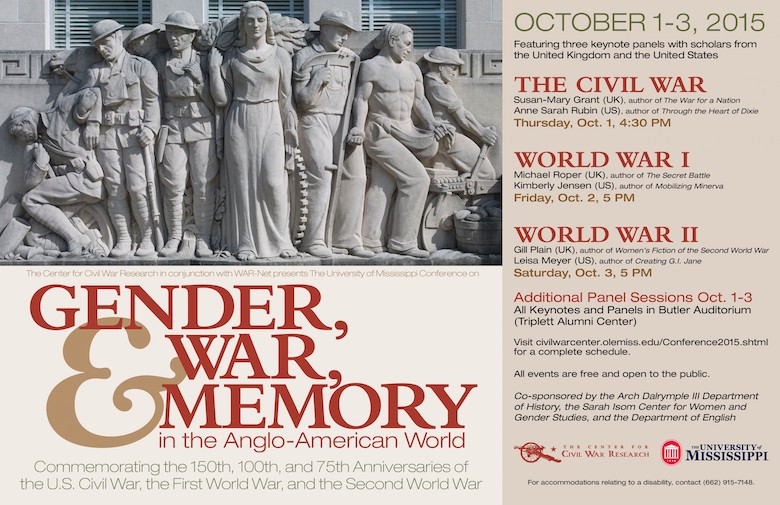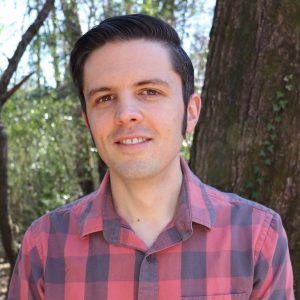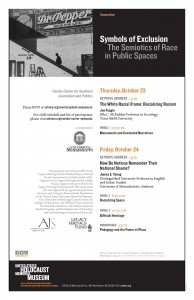American Historical Association
H-Net.org
American Historical Association
H-Net.org
 Please join the Center for Civil War Research and WAR-Net for the University of Mississippi Conference on Gender, Memory, and War in the Anglo-American World, which commemorates the 150th, 100th, and 75th Anniversaries of the U.S. Civil War, the First World War, and the Second World War. Panels will take place at Butler Auditorium on Thursday, Friday, and Saturday, October 1-3, 2015. The keynote speakers will be Anne Sarah Rubin of the University of Maryland, Baltimore County and Susan-Mary Grant of Newcastle University. All events are free and open to the public. For more information contact the Arch Dalrymple III Department of History at 662.915.7148 or via email, history@olemiss.edu.
Please join the Center for Civil War Research and WAR-Net for the University of Mississippi Conference on Gender, Memory, and War in the Anglo-American World, which commemorates the 150th, 100th, and 75th Anniversaries of the U.S. Civil War, the First World War, and the Second World War. Panels will take place at Butler Auditorium on Thursday, Friday, and Saturday, October 1-3, 2015. The keynote speakers will be Anne Sarah Rubin of the University of Maryland, Baltimore County and Susan-Mary Grant of Newcastle University. All events are free and open to the public. For more information contact the Arch Dalrymple III Department of History at 662.915.7148 or via email, history@olemiss.edu.
 Associate Professor of History
Associate Professor of History
Office hours: By Appointment
Bishop Hall
| pjpolgar@olemiss.edu
Education
Ph.D, The Graduate Center, City University of New York
Teaching and Research Interests
Slavery and Emancipation, Abolition and Social Reform, Race and Citizenship, Politics and Political Culture, African American History, 18th and 19th Century United States.
Paul J. Polgar is a historian of slavery, race, and emancipation in the United States, with a particular interest in Black freedom and rights movements from the Revolution through Reconstruction. He has published widely on race, citizenship, and anti-racist activism, from African American disfranchisement in early national New York to Black Boston’s protests against the film The Birth of the Nation.
His first book, Standard-Bearers of Equality: America’s First Abolition Movement (University of North Carolina Press, 2019), was a finalist for the Harriet Tubman Prize. It recovers the racially inclusive vision of the United States’ first abolition movement, created by a coalition of Black and white activists in the three decades following the American Revolution. By guarding and expanding the rights of people of African descent and demonstrating that Black Americans could become virtuous citizens of the new nation, these activists, whom Polgar names “first movement abolitionists,” sought to end white prejudice and eliminate racial inequality in the American republic. Beginning in the 1820s, however, the colonization movement, which viewed Black inequality as permanent and white prejudice as unconquerable, marginalized the activism of America’s first abolitionists and obscured the racially progressive origins of American abolitionism that Standard-Bearers of Equality recaptures. Through reinterpreting the early history of American antislavery, Polgar shows that the late eighteenth and early nineteenth centuries are as integral to histories of race, rights, and reform in the United States as the mid-nineteenth century.
Professor Polgar is now at work on two projects. His second book project extends his reevaluation of African American rights movements in the early United States by examining anew the emergence in the Reconstruction era of a broad electoral coalition in support of a pathbreaking expansion of Black civil and political rights. An Abolition Peace: Black Rights, the Union Cause, and the Rise of Radical Reconstruction will trace an evolving political culture in the 1860s that braided African American rights with Republican Party identity and the meaning and consequences of the Civil War. The popular political culture that undergirded the expansion of African American citizenship in the post-Civil War period viewed the progression of Black rights as a means of securing the Union as opposed to an end in itself. Therefore, while illustrating the ways in which national reunion became intertwined with assertions of Black citizenship during Reconstruction, this project will simultaneously reveal the limits of the popular political contours of such a vision as a durable mechanism for the elevation of African American rights. Polgar is also the co-editor of Constructing Racial Slavery in the Atlantic World (under review by the University of Pennsylvania Press), an edited collection of essays that situates the origins of slavery and race in the United States in a broader, comparative context of hemispheric scope.
Professor Polgar teaches undergraduate and graduate courses on U.S. history through 1877, American slavery, race, and emancipation, and U.S. historiography through Reconstruction.
As the warm coffee aroma filled Starbucks, Professor Shennette Garrett-Scott and her students met for a lecture while enjoying Teavana Oprah Chai Tea Lattes.
The tea was appropriate for the class, “The Power of O,” which focuses on billionaire Oprah Winfrey.
Winfrey, who was born in Mississippi, is an influential figure in many different areas. She is an actress, a movie and television producer, a philanthropist and an award-winning talk show host who owns a cable television network.
Garrett-Scott, an assistant professor of history and African-American Studies, said that she created the course as a way to “look critically at various aspects of Oprah’s life, career and brand to contextualize her experience.”
“My goal is to share some of my ruminations about Oprah’s impact on American culture and contemporary black women,” said Garrett-Scott, who was the speaker at a brown-bag event in February entitled “‘Oprah Don’t Play!’: Black Women and the (A)Politics of Respectability in the 21st Century.”
“Though Oprah’s story is often told as a rags-to-riches tale of an exceptional individual who overcame incredible odds, she did not emerge out of a vacuum nor does she operate in one,” Garrett-Scott said. “I wanted to draw in considerations of politics and the economy — or, more to the point, money and power — in and beyond popular media.”
The objective of the “Power of O” course, according to the syllabus, is to pay close attention to race and representation, gender, sexuality, economics and politics to explore where power lies and how it operates. Eight students are enrolled in the seminar class.
Dyamone White, a senior majoring in integrated marketing communications, is a student in the class.
“There are so many misconceptions about Oprah and her life, but Dr. Scott has revealed with evidence some true facts that make Oprah seem so regular – just like us,” White said.
Parker Hill, a philosophy major and student in the course, said that her most enjoyable discussion was based on an article identifying Oprah as a de facto feminist.
“The author claimed that despite her accumulation of wealth, allowing her to speak as freely as she pleases, the negative connotations of being a feminist made Oprah disassociate herself from being one in name,” Hill said. “Ironically, her personal actions comply with the idea of a feminist by some definitions. Some agreed with the assessment, others did not, but it was still interesting to discuss.”
When asked how black women can gain respect in the 21st century, Garrett-Scott responded, “The proper question to ask would be, ‘What can black women learn from their past to equip them for the challenges of the 21st century?’”
She continued on to say, “In some ways, these challenges are unique to our particular time and place. In others, they are persistent challenges in a society that continues to devalue blackness and womanness.”
Though Oprah is the focus of the course, “The Power of O” includes topics other than Oprah herself.
“We discuss theories like Antonio Gramsci and cultural hegemony and Jürgen Habermas and public spheres,” Garrett-Scott said.
The class has also explored the history of representations of black woman in popular media.
By Tisha Coleman | April 1, 2015 | courtesy of The Daily Mississippian
 The Overby Center for Southern Journalism and Politics presents “Symbols of Exclusion: The Semiotics of Race in Public Spaces,” on October 23-24, 2014.
The Overby Center for Southern Journalism and Politics presents “Symbols of Exclusion: The Semiotics of Race in Public Spaces,” on October 23-24, 2014.
This interdisciplinary symposium explored emerging Holocaust research on the semiotics of race in public spaces and efforts to memorialize histories of racialized atrocities, as well as current research on these topics in the American South. It was co-organized by the United States Holocaust Memorial Museum’s Jack, Joseph and Morton Mandel Center for Advanced Holocaust Studies and the University of Mississippi’s Department of Sociology and Anthropology and the Critical Race Studies Group.
By bringing together scholars, teachers, students, and community members, the Mandel Center’s outreach symposia seek to enrich campus dialogue and forge connections with diverse audiences that will ensure the vitality of Holocaust studies in an increasingly interdisciplinary and multicultural academic landscape.
 The 2014 Conference on The Civil War, “Science, Medicine, and Technology in the Civil War,” will be held October 9-10, 2014. The keynote address will be given by Charles D. Ross of Longwood University. His talk, “Black Powder and the Cannon’s Roar,” will examine a variety of topics ranging from the phenomenon of acoustic shadows to the operations taking place at the Confederate Powder Works in Augusta, Georgia. It will be presented October 9, 2014 at 6:30p.m. in the Overby Center Auditorium. Panel sessions on a host of topics, including changing definitions of metal illness and its treatment, the institutionalization of Union Veterans, the influence of dual revolutions in print and photography, and the dramatic consequences of Union telegraph failures at the Battle of Chancellorsville, will be held all day Friday, October 10, in the Butler Auditorium (Triplett Alumni Center). The Center will also also award the 2014 Wiley-Silver Prize, which recognizes the best first book on the Civil War published in the preceding year, thereby recognizing and encouraging new and emerging scholars in the history of the American Civil War. All events are free and open to the public.
The 2014 Conference on The Civil War, “Science, Medicine, and Technology in the Civil War,” will be held October 9-10, 2014. The keynote address will be given by Charles D. Ross of Longwood University. His talk, “Black Powder and the Cannon’s Roar,” will examine a variety of topics ranging from the phenomenon of acoustic shadows to the operations taking place at the Confederate Powder Works in Augusta, Georgia. It will be presented October 9, 2014 at 6:30p.m. in the Overby Center Auditorium. Panel sessions on a host of topics, including changing definitions of metal illness and its treatment, the institutionalization of Union Veterans, the influence of dual revolutions in print and photography, and the dramatic consequences of Union telegraph failures at the Battle of Chancellorsville, will be held all day Friday, October 10, in the Butler Auditorium (Triplett Alumni Center). The Center will also also award the 2014 Wiley-Silver Prize, which recognizes the best first book on the Civil War published in the preceding year, thereby recognizing and encouraging new and emerging scholars in the history of the American Civil War. All events are free and open to the public.
 On February 19 at 7PM in the Overby Center Auditorium, acclaimed photographer James Balog‘s award-winning documentary, Chasing Ice, opens the 2014 Environmental Studies Film and Lecture Series. This film was made by tracking glaciers world-wide through three years of time-lapse photography, and provides vivid evidence of global warming.
On February 19 at 7PM in the Overby Center Auditorium, acclaimed photographer James Balog‘s award-winning documentary, Chasing Ice, opens the 2014 Environmental Studies Film and Lecture Series. This film was made by tracking glaciers world-wide through three years of time-lapse photography, and provides vivid evidence of global warming.
The second documentary Last Call at the Oasis, about the world water crisis, will screen on March 19 at 7PM in the Overby Center Auditorium. This powerful documentary opens our eyes to the intensifying, world-wide water shortage.
The Earth Day lecture by University of Wisconsin-Madison Rachel Carson Professor of English Rob Nixon examines Slow Violence, Environmental Activism, and the Arts on April 22 at 7PM in the Overby Center Auditorium.
He writes: “Slow violence is a violence that occurs gradually and out of sight, a violence of delayed destruction that is dispersed across time and space, an attritional violence that is typically not viewed as violence at all. How can we create stories and images adequate to the pervasive but elusive environmental violence of delayed effects?” Rob Nixon will link the emergencies of the long term to artistic efforts to infuse such emergencies with dramatic urgency.
Nixon teaches environmental studies, postcolonial studies, creative nonfiction, African literature, world literature, and twentieth century British literature. He contributes regularly to The New York Times, The New Yorker, and Atlantic Monthly.
The films and lecture are free and open to the public.
Sponsored by the Environmental Studies Minor, College of Liberal Arts, Southern Documentary Project,Office of Sustainability, Croft Institute for International Studies, Sally McDonnell Barksdale Honors College, and the Departments of English and History.
Otis W. Pickett’s article “’We Are Marching to Zion’: Zion Church and the Distinctive Work of Presbyterian Slave Missionaries in Charleston, South Carolina, 1849–1874″ was selected as the best graduate student paper for the three volumes of the Proceedings for 2010- 2012 by the South Carolina Historical Association.